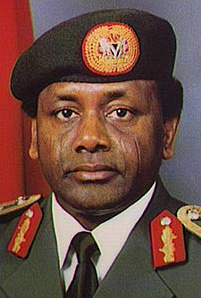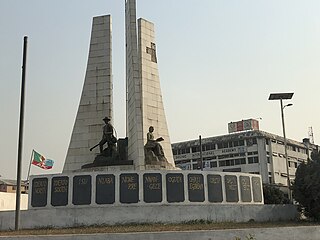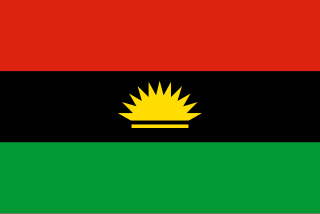
Nigeria, officially the Federal Republic of Nigeria, is a country in West Africa. It is the most populous country in Africa; geographically situated between the Sahel to the north, and the Gulf of Guinea to the south in the Atlantic Ocean; covering an area of 923,769 square kilometres (356,669 sq mi), with a population of over 211 million. Nigeria borders Niger in the north, Chad in the northeast, Cameroon in the east, and Benin in the west. Nigeria is a federal republic comprising 36 states and the Federal Capital Territory, where the capital, Abuja, is located. The largest city in Nigeria is Lagos, one of the largest metropolitan areas in the world and the second-largest in Africa.

The Federal Government of Nigeria is composed of three distinct branches: legislative, executive, and judicial, whose powers are vested by the constitution of Nigeria in the national assembly, the president, and the federal courts, including the supreme court, respectively. The constitution provides a separation and balance of powers among the three branches and aims to prevent the repetition of past mistakes made by the government.

Lagos is the largest city in Nigeria and the second most populous city in Africa, with a population of 14.8 million as of 2015 within the city proper. The Lagos metropolitan area has a total population of roughly 23.5 million as of 2018, making it the largest metropolitan area in Africa. Lagos is a major African financial centre and is the economic hub of Lagos State and Nigeria at large. Lagos is also among the top ten of the world's fastest-growing cities and urban areas. The megacity has the fourth-highest GDP in Africa and houses one of the largest and busiest seaports on the continent. The Lagos metropolitan area is a major educational and cultural centre in Sub Saharan Africa.

Nigeria is a federation of 36 states and 1 federal capital territory. Each of the 36 states is a semi-autonomous political unit that shares powers with the Federal Government as enumerated under the Constitution of the Federal Republic of Nigeria. The Federal Capital Territory, also known as FCT, is the capital of Nigeria and located in the city of Abuja. FCT is not a state but is administered by elected officials who are supervised by the Federal Government. Each state is sub-divided into Local Government Areas (LGAs). There are 774 local government in Nigeria. Under the Constitution, the 36 states are co-equal but not supreme because sovereignty resides with the Federal Government. The constitution can be amended by the National Assembly, but each amendment must be ratified by two-thirds of the 36 states of the federation.

Sani Abacha GCFR was a Nigerian military general who served as the military head of state of Nigeria from 1993 until his death in 1998. He was also Chief of Army Staff between 1985 to 1990; Chief of Defence Staff between 1990 to 1993; and Minister of Defence. In 1993, Abacha became the first Nigerian Army officer to attain the rank of a full military general without skipping a single rank.

Enugu is the capital of Enugu State in Nigeria. It is located in southeastern Nigeria. The city had a population of 722,664 according to the 2006 Nigerian census. The name Enugu is derived from the two Igbo words Énú Ụ́gwụ́ meaning "hill top" denoting the city's hilly geography. The city was named after Enugwu Ngwuo, under which coal was found. Enugwu Ngwuo is one of the ten villages that made up the Ngwuo clan, often referred to as the children of Ngwuako, the ancestral founder of the clan. Ngwuako positioned Udeneogu, his warrior son of on top of the hill (Enu-Ugwu) to protect the clan from invaders. Enugwu Ama Udeneogu, The people lived on the hilltop and farmed the sprawling surrounding valleys. Ngwuo has borders with Oshie clan in the south, Ojebeogene clan in the north and Nkanu clan in the east. The discovery of coal deposits on Enugwu Ngwuo farm lands down the valley, attracted people from all and sundry to the newly discovered wealth, in search for means of living, and as depicted in the map of the original plan for a government station, titled Enugwu Ngwo government station, this marked the core of the first urban settlement of what is today known as Enugu, started on Ngwuo land and it was called Enugwu Ngwuo until when it attained township status, the word Ngwo was removed for the convenience of pronunciation, thus a village of Ngwuo clan gave birth to a city which today has grown into a mega city, and still growing, engulfing the surrounding Nkanu towns of Nike and Akunino and stretching towards Neke and Emene.

Lagos State is a state located in the southwestern geopolitical zone of Nigeria. The smallest in area of Nigeria's 36 states, with a population of over 15 million.

The Nigerian Civil War was a civil war fought between the government of Nigeria and the Republic of Biafra, a secessionist state which had declared its independence from Nigeria in 1967. Nigeria was led by General Yakubu Gowon, while Biafra was led by Lt. Colonel Odumegwu Ojukwu. Biafra represented the nationalist aspirations of the Igbo ethnic group, whose leadership felt they could no longer coexist with the federal government dominated by the interests of the Muslim Hausa-Fulanis of northern Nigeria. The conflict resulted from political, economic, ethnic, cultural and religious tensions which preceded Britain's formal decolonization of Nigeria from 1960 to 1963. Immediate causes of the war in 1966 included ethno-religious violence and anti-Igbo pogroms in Northern Nigeria, a military coup, a counter-coup and persecution of Igbo living in Northern Nigeria. Control over the lucrative oil production in the Niger Delta also played a vital strategic role.

The Niger Delta is the delta of the Niger River sitting directly on the Gulf of Guinea on the Atlantic Ocean in Nigeria. It is typically considered to be located within nine coastal southern Nigerian states, which include: all six states from the South South geopolitical zone, one state (Ondo) from South West geopolitical zone and two states from South East geopolitical zone. Of all the states that the region covers, only Cross River State is not an oil-producing state.

Rivers State also known simply as Rivers, is a state in the Niger Delta region of southern Nigeria. Formed in 1967, when it was split from the former Eastern Region, Rivers State borders Imo and Abia States to the north, Akwa Ibom State to the east, and Bayelsa and Delta states to the west. The state capital, Port Harcourt, is a metropolis that is considered the commercial center of the Nigerian oil industry.

Bayelsa is a state in southern part of Nigeria, located in the core of the Niger Delta region. Bayelsa State was created in 1996 from Rivers State, making it one of the newest states in the federation. It shares a boundary with Rivers State to the east and Delta State to the west, with the waters of the Atlantic Ocean dominating its southern borders. It has a total area of 10, 773 km2. The state is comprised of eight Local Government Areas, they are: Ekeremor, Kolokuma/Opokuma, Yenagoa, Nembe, Ogbia, Sagbama, Brass and Southern Ijaw.The state borders Rivers State, of which it was formerly part, and Delta State.

Kwara is a state in Western Nigeria. Its capital is Ilorin. Kwara is located within the North Central geopolitical zone. The primary ethnic group is Yoruba, with significant Fulani, Nupe, and Bariba minorities. kwara comprises 16 local government areas.

Osun is an inland state in south-western Nigeria. Its capital is Osogbo. It is bounded in the north by Kwara State, in the east partly by Ekiti State and partly by Ondo State, in the south by Ogun State and in the west by Oyo State. The state's current governor is Adegboyega Oyetola, who was declared winner of the September 2018 governorship elections. He was declared winner of the 27 September, 2018 rerun elections after the initial 22 September, 2018 gubernatorial election was declared inconclusive by the Independent National Electoral Commission (INEC). Adegboyega Oyetola is the 4th Democratic governor of Osun State and the 9th Governor of the state since the state was created.

Mass media in Nigeria has an interesting and long history.

Imo State is one of the 36 States of Nigeria, located in the southeast region of the country. Formed in 1976 when it split from the former East-Central State, Imo State is bordered by Abia State on the east, Delta State to the West, Anambra State on the north, and Rivers State to the south. The state capital, Owerri, is often described as the entertainment capital of Nigeria.
The mining of minerals in Nigeria accounts for only 0.3% of its gross domestic product, due to the influence of its vast oil resources. The domestic mining industry is underdeveloped, leading to Nigeria having to import minerals that it could produce domestically, such as salt or iron ore. Rights to ownership of mineral resources is held by the Federal government of Nigeria, which grants titles to organizations to explore, mine, and sell mineral resources. Organized mining began in 1903 when the Mineral Survey of the Northern Protectorates was created by the British colonial government. A year later, the Mineral Survey of the Southern Protectorates was founded. By the 1940s, Nigeria was a major producer of tin, columbite, and coal. The discovery of oil in 1956 hurt the mineral extraction industries, as government and industry both began to focus on this new resource. The Nigerian Civil War in the late 1960s led many expatriate mining experts to leave the country. Mining regulation is handled by the Ministry of Solid Minerals Development, which oversees the management of all mineral resources. Mining law is codified in the Federal Minerals and Mining Act of 1999. Historically, Nigeria's mining industry was monopolized by state-owned public corporations. This led to a decline in productivity in almost all mineral industries. The Obasanjo administration began a process of selling off government-owned corporations to private investors in 1999. The Nigerian Mining Industry has picked up since the "Economic Diversification Agenda", from Oil & Gas, to Agriculture, Mining, etc., began in the country.
Zeem, or Chaari, is an endangered Chadic dialect cluster of Nigeria, whose speakers are shifting to Hausa. Dyarim is closely related.

Rear Admiral Allison Amaechina Madueke is a retired Nigerian naval officer. He was Chief of Naval Staff from 1993 to 1994, military governor of Anambra State from January 1984 to August 1985, and Imo State military governor from 1985 to 1986.
The High Court of Justice is the highest court of Rivers State, Nigeria. It is composed of the Chief Judge of Rivers State and such number of judges appointed by the Governor on the recommendation of the National Judicial Council and subject to confirmation by the Rivers State House of Assembly.

Igbo nationalism refers to a range of ethnic nationalist ideologies relating to the Igbo people of southeastern Nigeria. While the term is defined as seeking Igbo self-determination by some, others argue that it refers to the preservation and revival of Igbo culture and, for others, the development of Igboland stemming from the philosophy, Aku luo uno, which means "wealth builds the home".
















